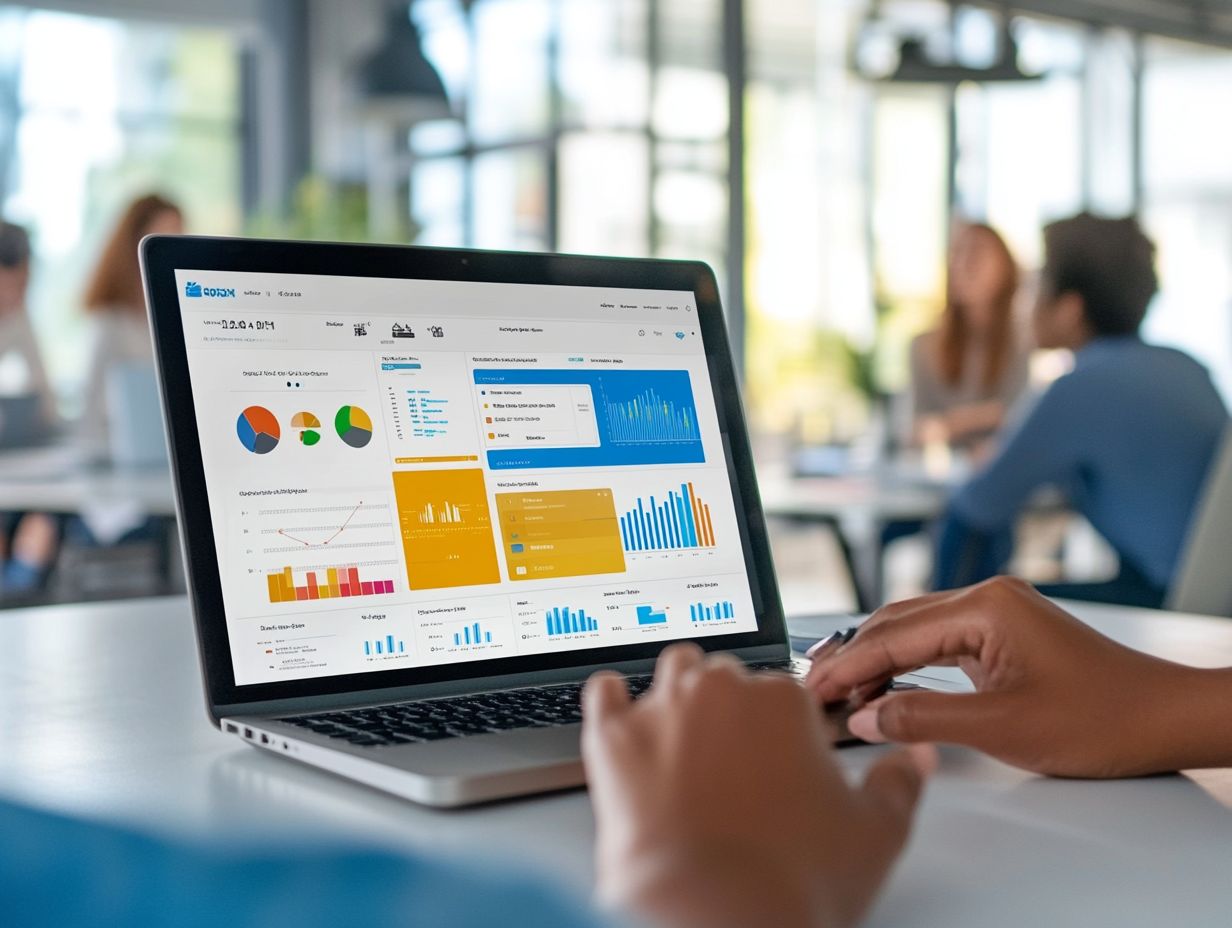How to Use CRM to Improve Customer Experience?
In today s competitive landscape, grasping the connection between Customer Relationship Management (CRM) and customer experience is essential for any business aspiring to flourish.
This article delves into what CRM is and how it can significantly enhance your customer interactions. It highlights the tangible benefits of utilizing CRM systems, from improved communication and personalization to boosted customer retention and loyalty.
You ll discover how to implement the right CRM solution, measure its success, and adopt best practices that lead to optimal customer satisfaction.
Join us as we unveil strategies that will elevate your customer experience through effective CRM practices.
Contents
- Key Takeaways:
- Understanding CRM and Customer Experience
- Benefits of Using CRM for Customer Experience
- Implementing CRM for Better Customer Experience
- Measuring the Success of CRM for Customer Experience
- Top CRM Practices to Enhance Customer Experience
- Frequently Asked Questions
- What is CRM and why is it important for improving customer experience?
- How can CRM help businesses improve customer retention?
- Is CRM suitable for all types of businesses?
- How can businesses use CRM to personalize the customer experience?
- What are some features of CRM that can improve customer experience?
- Can CRM help businesses anticipate and prevent customer issues?
Key Takeaways:

Utilize CRM to enhance customer experience by improving communication and personalizing interactions with customers.
Increase customer retention and loyalty through the use of CRM, fostering long-term relationships and customer satisfaction.
Measure the success of CRM by tracking key metrics and implement best practices for effective use, such as choosing the right system and integrating it into business processes.
Understanding CRM and Customer Experience
Customer Relationship Management (CRM) is an essential strategy that elevates your customer experience. It streamlines processes, enhances interactions, and leverages customer data to provide deep insights into their needs and preferences.
In today s digital enterprise landscape, companies like Chip House and Insightly harness CRM systems to personalize their communications and boost customer satisfaction, all while fostering loyalty and gaining a competitive edge.
Research from well-known organizations shows that effective CRM implementation significantly influences the customer journey.
Defining CRM and Customer Experience
CRM, or Customer Relationship Management, encompasses the strategies and technologies you employ to manage your interactions with both potential and current customers. The goal is clear: enhance customer satisfaction and streamline those all-important interactions.
This integrated approach comprises several key components, including systems that help you keep and understand customer information better. You’ve got tools to track potential sales opportunities, along with customer service tools that facilitate support and communication.
By leveraging these elements, you can significantly elevate the overall customer experience. This experience hinges on customer satisfaction, their unique needs, and the ongoing interactions they have with your brand.
By grasping these dynamics, you can tailor your strategies to ensure that every touchpoint adds value to the relationship. This ultimately fosters loyalty and reinforces a positive connection with your customers.
Benefits of Using CRM for Customer Experience
By utilizing CRM systems, you gain exciting benefits that transform your customer experience. To learn more about maximizing these tools, check out how to utilize CRM for customer feedback. This not only fosters stronger interactions but also boosts customer satisfaction.
Ultimately, these improvements pave the way for cultivating lasting customer loyalty for your business. Start using CRM today to revolutionize your customer interactions and drive loyalty!
Improving Communication and Personalization
CRM gives you the power to enhance communication by personalizing interactions based on customer preferences, ensuring that your communication resonates with each individual.
By harnessing valuable customer data and insights, you can craft messages that speak directly to the needs and desires of your audience. This tailored approach not only boosts engagement but also cultivates loyalty and trust.
Advanced CRM systems offer tools like email templates and task lists, enabling you to automate routine interactions and streamline workflows.
These functionalities enhance overall communication efficiency, allowing you to focus on building meaningful relationships instead of getting bogged down by repetitive tasks.
Enhancing Customer Retention and Loyalty

By employing targeted strategies through a Customer Relationship Management (CRM) system, you can significantly enhance customer retention and loyalty. Both are essential for achieving long-term success in today s competitive markets.
These tools offer invaluable insights by tracking customer interactions across various channels. This allows you to effectively gauge satisfaction levels. For example, analyzing feedback collected in real-time from multiple touchpoints helps identify patterns that highlight your most loyal customers.
Implementing effective loyalty programs, such as exclusive rewards for frequent purchasers, incentivizes continued engagement. Referral bonuses also strengthen your loyalty strategy by ensuring your existing customers remain engaged and help attract new clients.
Implementing CRM for Better Customer Experience
Implementing CRM effectively can elevate your customer experience to new heights.
By streamlining processes and automating tasks, you create a seamless journey that keeps your clients engaged and satisfied.
Choosing the Right CRM System
To make the best choice, consider these key criteria:
Scalability is crucial. It guarantees that the system can evolve as your business expands.
User-friendliness is equally important. A simple interface encourages quicker adoption by your team.
Integration capabilities are significant too. They allow your CRM to harmonize effortlessly with existing tools and software, ensuring smooth workflows.
Don t underestimate the importance of customer support; having responsive assistance can make a world of difference during implementation and troubleshooting.
Today s market offers a plethora of options tailored to various business sizes and sectors. From scalable solutions designed for growing enterprises to streamlined versions perfect for small businesses just starting their journey, there is something for everyone.
Integrating CRM into Business Processes
Integrating CRM into your business processes is essential for ensuring that customer data flows effortlessly throughout the journey.
This integration streamlines communication and provides access to critical customer insights by connecting various business tools and platforms.
For example, linking your marketing automation software with CRM systems allows you to track customer behaviors and preferences effectively. This enables you to craft personalized messaging that resonates with your audience.
Utilizing automation tools can significantly reduce manual tasks. This liberates your teams to concentrate on strategic initiatives.
As these systems collaborate, they create a comprehensive view of customer interactions. This ultimately leads to better decision-making and enhanced customer satisfaction. You can swiftly adapt to your clients’ evolving needs and preferences.
Measuring the Success of CRM for Customer Experience
Measuring the success of your CRM initiatives is essential for understanding their impact on customer experience.
Unlock the full potential of your CRM today by measuring key metrics that reveal how well you re satisfying your customers!
By honing in on these metrics, you gain deeper insights into how effectively your strategies resonate with your audience.
Key Metrics to Track

Key metrics to track in your Customer Relationship Management (CRM) system include customer satisfaction scores, interaction frequency, and data reporting insights. These elements are essential for understanding customer behavior.
Monitoring these metrics is vital to refining your strategies and enhancing customer engagement. You can track customer satisfaction scores through surveys and feedback forms, providing valuable insights into areas for improvement and helping you tailor your services effectively.
Keeping an eye on customer interaction frequency allows you to pinpoint your most engaged clients and adapt your outreach efforts accordingly.
For example, a retail company can leverage data reporting insights from its CRM to identify purchasing trends. This enables them to stock popular items and personalize promotions for specific segments.
By effectively utilizing these metrics, you can cultivate stronger relationships with your customers and drive growth for your business.
Top CRM Practices to Enhance Customer Experience
Implementing best practices in CRM usage is crucial for businesses that want to enhance customer experience, including learning how to use surveys to improve CRM practices.
By embracing these practices, you cultivate customer loyalty and ensure your marketing strategies meet individual needs.
Effective Strategies and Tips
Effective strategies for utilizing CRM focus on understanding customer preferences, harnessing automation tools, and ensuring seamless communication to elevate customer interactions.
To maximize the benefits of these platforms, adopt actionable approaches tailored to your unique customer base.
For instance, analyzing past purchase behaviors can unveil critical insights into what drives customer satisfaction and loyalty. By segmenting your audience based on these preferences, you can deliver targeted marketing materials that resonate effectively.
Embracing automation tools not only saves you precious time but also enables consistent, personalized follow-ups without overwhelming your customers.
Imagine this: a case study featuring a retail company showcased how implementing such strategies within their CRM led to a remarkable 30% increase in customer engagement. This illustrates the tangible rewards of optimizing your communication and interactions.
Frequently Asked Questions
What is CRM and why is it important for improving customer experience?
CRM stands for Customer Relationship Management. It is a software tool that allows businesses to manage their interactions and relationships with customers. It is essential for improving customer experience because it helps businesses understand their customers’ needs and preferences, enabling personalized and efficient service.
How can CRM help businesses improve customer retention?

CRM helps businesses improve customer retention by organizing customer data. This allows businesses to track and analyze customer behavior and preferences, creating targeted marketing campaigns and providing personalized customer service. For more insights, check out best practices for using CRM software, which leads to higher customer satisfaction and loyalty.
Is CRM suitable for all types of businesses?
Yes, CRM can be used by all types of businesses, regardless of size or industry. It is a versatile tool that can be customized to meet each business’s specific needs and goals. Whether you are a small startup or a large corporation, CRM can help you improve customer experience and drive business growth.
How can businesses use CRM to personalize the customer experience?
CRM allows businesses to collect and store customer data, such as purchase history, preferences, and communication history. This information can be used to create personalized interactions and offers for customers, making them feel valued. Personalization can lead to increased customer satisfaction and loyalty.
Ready to elevate your customer experience? Explore CRM tools today and see the difference they can make!
What are some features of CRM that can improve customer experience?
CRM features like customer data management and automated marketing campaigns can greatly enhance customer experience.
Tracking customer communication and managing service tickets also play key roles.
Can CRM help businesses anticipate and prevent customer issues?
Yes, CRM can help businesses anticipate and prevent customer issues.
By looking at this information, businesses can identify potential issues before they occur.






